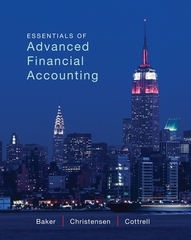Question
Summarize the following. Potential to produce economic benefits 4.14 An economic resource is a right that has the potential to produce economic benefits. For that
Summarize the following.
| Potential to produce economic benefits 4.14 An economic resource is a right that has the potential to produce economic benefits. For that potential to exist, it does not need to be certain, or even likely, that the right will produce economic benefits. It is only necessary that the right already exists and that, in at least one circumstance, it would produce for the entity economic benefits beyond those available to all other parties. 4.15 A right can meet the definition of an economic resource, and hence can be an asset, even if the probability that it will produce economic benefits is low. Nevertheless, that low probability might affect decisions about what information to provide about the asset and how to provide that information, including decisions about whether the asset is recognised (see paragraphs5.15-5.17) and how it is measured. 4.16 An economic resource could produce economic benefits for an entity by entitling or enabling it to do, for example, one or more of the following: (a) receive contractual cash flows or another economic resource; (b) exchange economic resources with another party on favourable terms; (c) produce cash inflows or avoid cash outflows by, for example: (i) using the economic resource either individually or in combination with other economic resources to produce goods or provide services; (ii) using the economic resource to enhance the value of other economic resources; or (iii) leasing the economic resource to another party; (d) receive cash or other economic resources by selling the economic resource; or (e) extinguish liabilities by transferring the economic resource. 4.17 Although an economic resource derives its value from its present potential to produce future economic benefits, the economic resource is the present right that contains that potential, not the future economic benefits that the right may produce. For example, a purchased option derives its value from its potential to produce economic benefits through exercise of the option at a future date. However, the economic resource is the present right the right to exercise the option at a future date. The economic resource is not the future economic benefits that the holder will receive if the option is exercised. |
| Control 4.19 Control links an economic resource to an entity. Assessing whether control exists helps to identify the economic resource for which the entity accounts. For example, an entity may control a proportionate share in a property without controlling the rights arising from ownership of the entire property. In such cases, the entity's asset is the share in the property, which it controls, not the rights arising from ownership of the entire property, which it does not control. 4.20 An entity controls an economic resource if it has the present ability to direct the use of the economic resource and obtain the economic benefits that may flow from it. Control includes the present ability to prevent other parties from directing the use of the economic resource and from obtaining the economic benefits that may flow from it. It follows that, if one party controls an economic resource, no other party controls that resource. 4.21 An entity has the present ability to direct the use of an economic resource if it has the right to deploy that economic resource in its activities, or to allow another party to deploy the economic resource in that other party's activities. 4.22 Control of an economic resource usually arises from an ability to enforce legal rights. However, control can also arise if an entity has other means of ensuring that it, and no other party, has the present ability to direct the use of the economic resource and obtain the benefits that may flow from it. For example, an entity could control a right to use know-how that is not in the public domain if the entity has access to the know-how and the present ability to keep the know-how secret, even if that know-how is not protected by a registered patent. 4.23 For an entity to control an economic resource, the future economic benefits from that resource must flow to the entity either directly or indirectly rather than to another party. This aspect of control does not imply that the entity can ensure that the resource will produce economic benefits in all circumstances. Instead, it means that if the resource produces economic benefits, the entity is the party that will obtain them either directly or indirectly. 4.24 Having exposure to significant variations in the amount of the economic benefits produced by an economic resource may indicate that the entity controls the resource. However, it is only one factor to consider in the overall assessment of whether control exists. 4.25 Sometimes one party (a principal) engages another party (an agent) to act on behalf of, and for the benefit of, the principal. For example, a principal may engage an agent to arrange sales of goods controlled by the principal. If an agent has custody of an economic resource controlled by the principal, that economic resource is not an asset of the agent. Furthermore, if the agent has an obligation to transfer to a third party an economic resource controlled by the principal, that obligation is not a liability of the agent, because the economic resource that would be transferred is the principal's economic resource, not the agent's. |
Step by Step Solution
There are 3 Steps involved in it
Step: 1

Get Instant Access to Expert-Tailored Solutions
See step-by-step solutions with expert insights and AI powered tools for academic success
Step: 2

Step: 3

Ace Your Homework with AI
Get the answers you need in no time with our AI-driven, step-by-step assistance
Get Started


